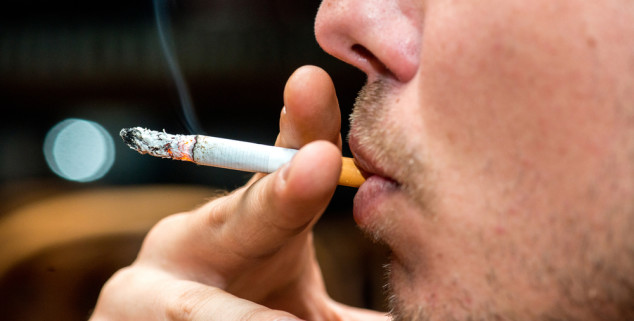News
LAO: Ballot initiative would triple cigarette taxes
 A cigarette smoker enjoying his habit. (Photo: Pe3k, via Shutterstock)
A cigarette smoker enjoying his habit. (Photo: Pe3k, via Shutterstock)An initiative aimed at next year’s ballot to more than triple the tax on California cigarettes would raise at least $1.3 billion annually, with the money going to an array of health and other programs, according to the Legislature’s nonpartisan fiscal adviser.
The Legislative Analyst’s Office reported Monday that the proposal to add $2 in taxes to a pack of cigarettes would increase the per-pack taxes to $2.87, which would increase the total cost to nearly $9 per pack. The current average retail cost of a pack of cigarettes is nearly $6.
Other tobacco products also would be subject to higher taxes if the initiative was approved — including nicotine-containing e-cigarettes, which would be taxed for the first time as a tobacco product.
“The $2 per pack cigarette tax increase would lead to an equivalent increase in the tax rate on other tobacco products, which is currently equivalent to a $1.37 per pack tax on cigarettes,” the LAO reported. “The new tax rate on other tobacco products would be equivalent to a $3.37 per pack tax on cigarettes.”
The proposed initiative initiative, which if approved would take effect in April 2017, is supported by the California Medical Association, the California Lung Association, the Service Employees International Union and hedge-fund billionaire Tom Steyer, among others.
Currently, about $400 million is collected annually from tobacco taxes and distributed to state and local governments, including programs to further tobacco research and health care, the LAO said.
The money collected under the new plan, between $1.3 billion and $1.6 billion, would be used for existing healthcare programs and services, including ” tobacco-related prevention and cessation programs, law enforcement programs (and) medical research on tobacco-related diseases.”
The University of California would receive some $40 million annually to increase the number of primary care and emergency physicians. Currently, about 8,000 graduate medical students are trained at six campuses.
In the past, increases in cigarette taxes have been accompanied by declines in cigarette use, as smokers find the increased cost prohibitive. But some smokers also may turn to purchasing cigarettes online in hopes of avoiding the potential tax. “For example, consumers could avoid paying the new tax on e-cigarettes by purchasing untaxed e-cigarettes from Internet vendors,” the LAO noted.
California voters in recent years have twice rejected increasing cigarette taxes. A bill to boost cigarette taxes, SB 591 by Sen. Richard Pan, a physician, was derailed earlier this year in the Legislature.
Want to see more stories like this? Sign up for The Roundup, the free daily newsletter about California politics from the editors of Capitol Weekly. Stay up to date on the news you need to know.
Sign up below, then look for a confirmation email in your inbox.

By taxing lifesaving vapor products at the same rate as lethal cigarettes, this ballot initiative would:
– financially punish vapers because they quit smoking,
– encourage some vapers to switch back to lethal cigarettes,
– discourage smokers from switching to far lower risk vaping, and
– deceive the public to believe vaping is just as harmful as smoking cigarettes.
So why are groups that purportedly claim to be concerned about public health advocating a tax policy that threatens public health by keeping smokers smoking?
The answer is that the groups promoting this tax hike are the very same groups that will receive much of increased tax revenue (if the initiative passes).